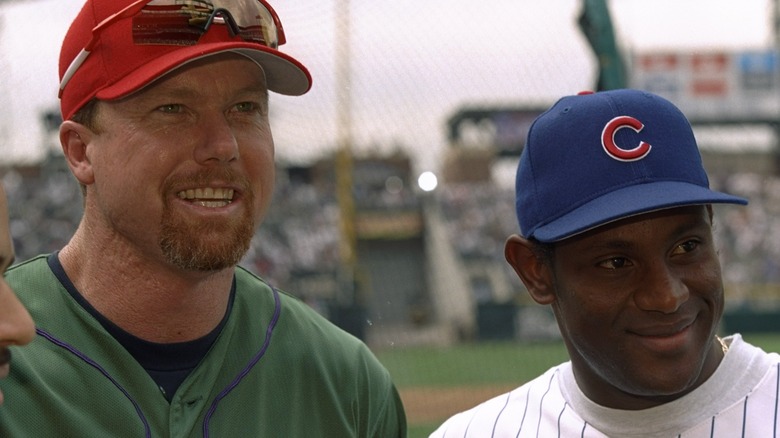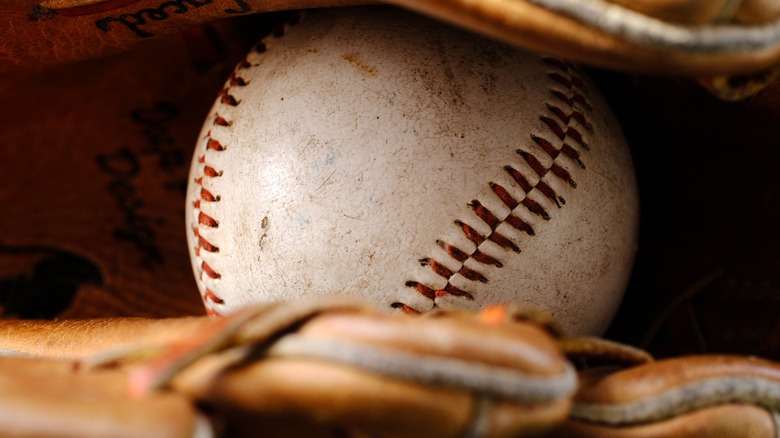Inside The Mark McGwire Vs. Sammy Sosa Home Run Race
Back in 1998, the baseball world got just what it needed, and at just the right time, too. As NBC News reports, a strike four years earlier had left a sour taste in the mouths of baseball fans, and a dark shadow hung over the sport. Attendance was down, and it looked, to some observers anyway, as if baseball was on its way to becoming an afterthought in the American sports landscape. Then the unexpected happened: a record that had stood for half a century was in danger of being broken, not by one, but by two men. Mark McGwire and Sammy Sosa (pictured above) both chased the single-season home run record, which at the time was held by Roger Maris. According to the Baseball Almanac, Maris hit 61 home runs in the 1961 season, and by the second half of the 1998 season, it appeared that both McGwire and Sosa would be on pace to tie or beat it.
The race for the record, and the friendly rivalry between the two men, injected some much-needed energy into the moribund sport. Both wound up beating Maris' record, although McGwire came out on top, with 70 homers to Sosa's 66, according to Bleacher Report.
McGwire and Sosa
Mark McGwire and Sammy Sosa were, in many ways, polar opposites. McGwire, the older of the two men, was born in California and was the son of a dentist, according to the L.A. Times. Sosa, five years younger, grew up in the Dominican Republic, according to Britannica, and did odd jobs such as shining shoes to support his family.
McGwire made a name for himself at the beginning of his career with the Oakland Athletics before moving to the St. Louis Cardinals for what would be the twilight of his career. Sosa, after two brief and lackluster stints with other teams, joined the Cardinals' National League rivals, the Chicago Cubs, and immediately became a star player on the team.
Both men had already established themselves as reliable and prolific home run hitters well before the 1998 season. But at some point during that fateful year, it became apparent that both of them were going to close in on, if not beat, Maris' record.
The home run chase
"In '98, Mark and I came in and put on a show together," Sosa would say of the home run chase back in 2018, 20 years later, via NBC News. And what a show it was.
It is, of course, impossible to pinpoint exactly when the baseball world collectively realized that Sosa and McGwire were within sight of Maris' record, but once it was out there, there was no reeling it back in. ESPN would cut from whatever game they were showing whenever Sosa or McGwire was at bat. Meanwhile, Major League Baseball was getting a much-needed attendance boost: two years earlier, league attendance was in the 60 million range; by the end of 1998, it would be 70.6 million. And of course, the record, and the rivalry between the two men, would dominate the sports headlines that summer and fall.
McGwire would actually be the man to (first) break Maris' record. On September 8, 1988, according to MLB's YouTube channel, in front of the hometown crowd at St. Louis' Busch Stadium, and against Sosa and the Cubs no less, McGwire hit No. 62. And in a touching moment of sportsmanship, Sosa would join his rival for the celebrations. McGwire would end the season with 70 homers, Sosa with 66.
Questions of cheating
The Sosa-McGwire home run chase may have injected some desperately-needed energy into Major League Baseball at a time when it needed it the most. But behind the scenes, there was another sort of injecting taking place: steroids.
NBC News comes right out and calls that period of baseball history the Steroid Era, and players left and right were using the performance-enhancing drug; MLB wouldn't even implement wide-scale steroid testing until 2003.
McGwire admitted to using steroids, although it took him a while to get there. In 2005, when he was called to testify before Congress about his alleged use, he deflected, saying he wasn't in town to "talk about the past." In 2010, McGwire admitted that he had in fact used steroids during the 1998 season. Sosa, for his part, consistently denied using steroids, although the New York Times later reported that, in 2003, his name was on a list of MLB players who had tested positive for using performance-enhancing drugs.



